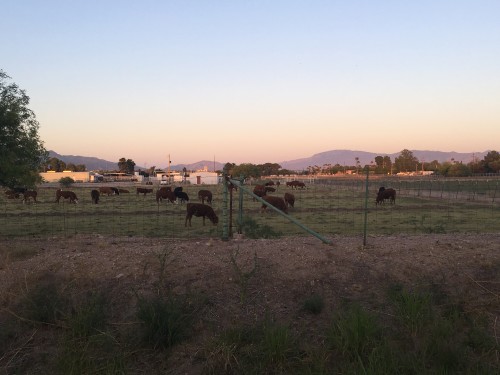
Cattle thieves took more than $100 grand from Doug Kuhn, and the state didn’t have the resources to seek justice.
It’s impossible to know exactly how much Kuhn lost. He’s a rancher. Ranchers rarely know exactly how many animals they own.
All Kuhn knew for sure, is that he was missing one-quarter of his herd. He estimates that thieves took 54 cows and their calves from one of his pastures just outside of Willcox. If each cow had a calf with her, which he believes they did, that’s 108 animals he potentially lost. According to Kuhn, each cow-calf pair is worth $3,000 today, so he would have lost about $162,000.
From 2014 to 2015, livestock theft cases reported to the state rose by 120 percent. Already in the current fiscal year, 29 possible livestock theft cases have been reported. That’s more than half of last year’s reported thefts, and we’re only four months into the year.
These numbers only reflect what has been reported to the state. Many people report cattle or livestock theft to their local police department, which would not get included in state livestock theft statistics. The Arizona Department of Agriculture’s Animal Services Division estimates that these numbers are low, but there is no way to include reports to police departments in their statistics.
“When livestock is worth this much, as it is these days, there’s going to be more and more of this (theft) and when people know they aren’t going to pay the price,” Kuhn said.
This isn’t the first time Kuhn has had his cattle stolen, but he knew who did it before. It took six months to get his cattle back, despite DNA tests three months into the investigation proving they were his animals. He also had to pay for the impound fees of his cattle.
Ten years ago, Arizona had between 125 and 150 cattle inspectors. Part of their job is investigating livestock theft. Today, there are 20 statewide. Only 14 of those inspectors are full-time. Only eight of Arizona cattle inspectors are police officers. This means that only eight people in the state can investigate livestock theft cases. But that’s not their only job.
The eight livestock inspectors who are also police officers are responsible for responding to animal cruelty cases, inspecting animals and monitoring auctions. In 2015, there were nearly 6,000 livestock inspections in Arizona, which does not reflect animals monitored when being traded. Livestock inspectors spend most of their time monitoring auctions, according to Leatta McLaughlin, the associate director for Animal Services at the Department of Agriculture.
Currently the state is investigating eight cases of livestock theft. All are cattle related. The majority of theft cases reported to the Department of Agriculture are deemed unfounded. This means that the state decided that these cases did not involve theft, but ranchers do not necessarily agree.
The state’s chief livestock officer, Capt. Richard Shore, said the state ends cattle-theft investigations on a case-by-case basis. If the state can’t get enough information, the investigators often seek help from the victim of the theft.
Having eight people to investigate cases of livestock theft simply isn’t enough, according to McLaughlin. It’s common for livestock inspectors to solve a case five to 10 years after the animal was actually stolen, when an animal shows up at an auction with multiple brands or a manipulated brand.
“It’s just like a homicide case,” Shore said. “You can have homicide cases sit on the shelf cold.”
Shore said that stealing livestock is considered theft. He said that charges depend on the value of the animal and how many animals were stolen.
“If you’ve never been convicted of a crime, it could be as simple as a slap on the wrist,” he said.
People are charged with a count of theft per animal stolen. The higher the value of the animal, the higher class crime you’re charged with.
Someone found to be stealing a single cow would most likely be charged with Class 6 Felony Theft. This charge is reserved for the theft of property valued between $1,000 and $2,000. If found guilty one may be sentenced to four months to two years in prison. Those convicted would also be required to pay a fine of up to $150,000.
“It all depends on what the prosecuting attorney wants to do with it,” Shore said, and some cases will be pled down.
The Department of Agriculture was the first law-enforcement agency to investigate cattle theft in the state, according to Shore.
He said cattle rustling has been going on since the late 1800s, but it’s difficult to compare cattle theft numbers because there are more people ranching today.
Shore warns the public to avoid catching livestock thieves on their own. He said a couple of cattle thieves were also involved in the meth industry, which is often a dangerous environment.
“If someone is willing to steal cattle and with Arizona being a right-to-own guns state, anybody could be dangerous,” Shore said.
Meryl Engle is a reporter for Arizona Sonora News, a service from the School of Journalism with the University of Arizona. Contact her at [email protected].


